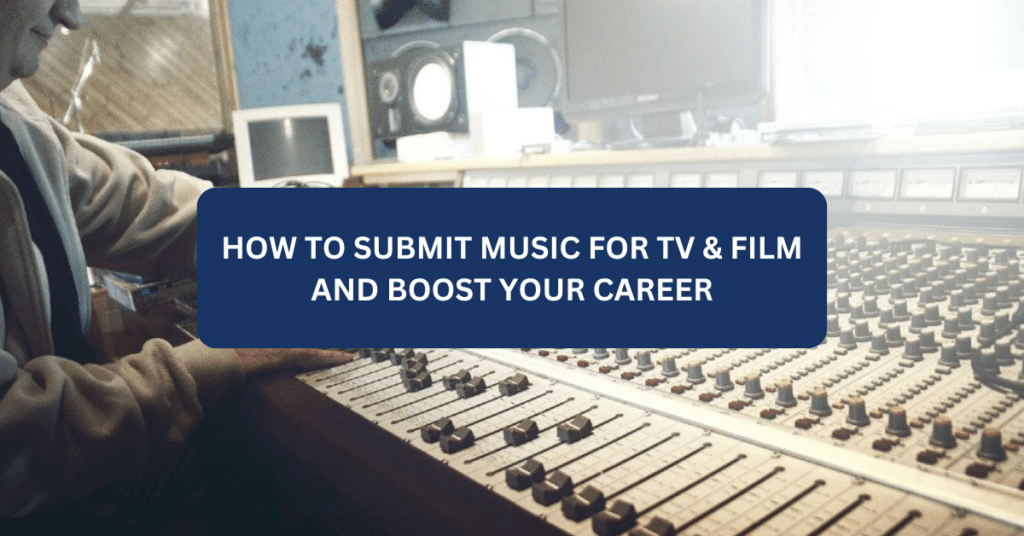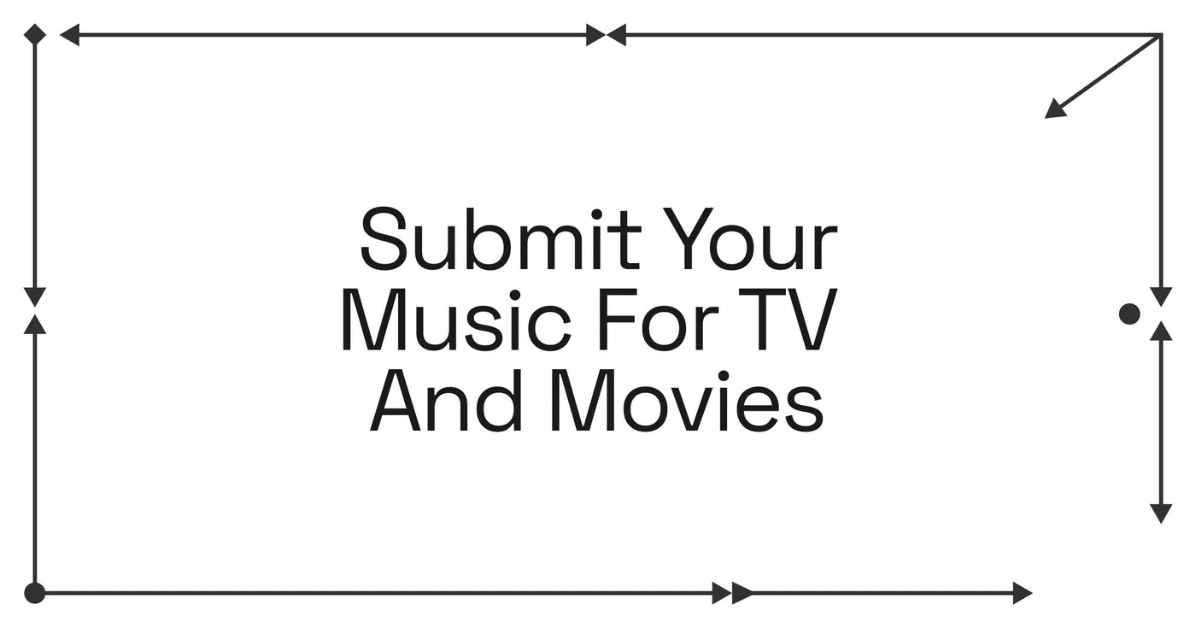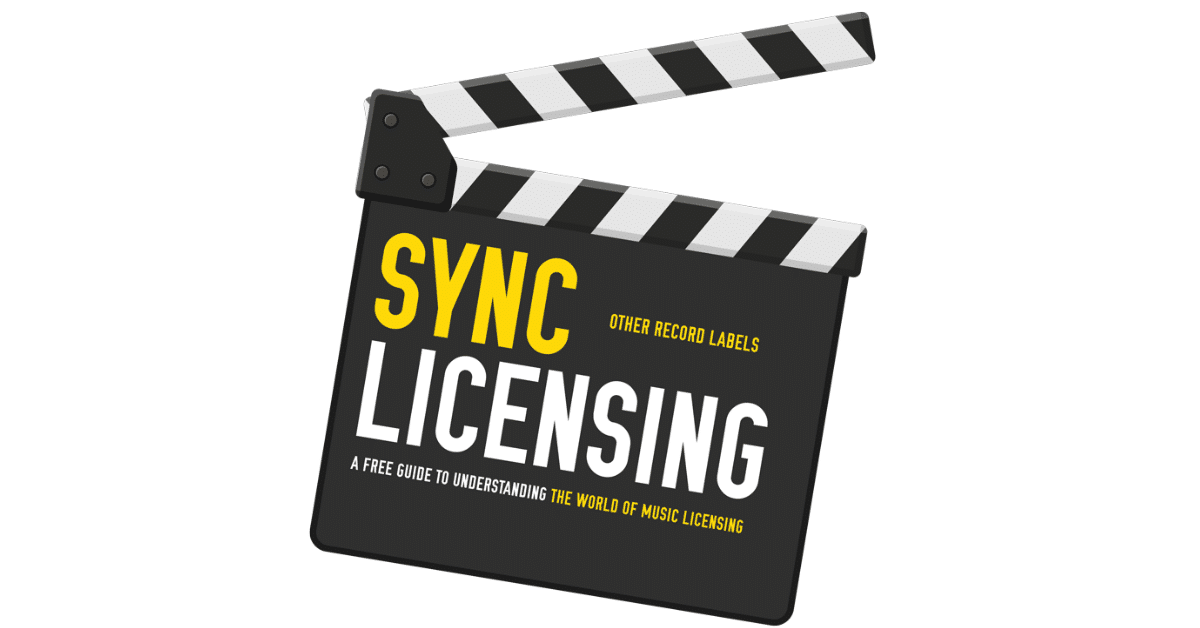Submitting Music for TV & Film is an exciting opportunity for any artist looking to grow their career. Getting your music placed in TV shows or films can provide massive exposure and consistent royalties. In fact, music licensing has become a billion-dollar industry, with global sync licensing revenues surpassing $1 billion annually. For independent artists, this means a chance to earn royalties every time their track is used in a film, TV show, or advertisement.
By submitting your music for TV and film placements, you open doors to new audiences and consistent passive income. More than 70% of TV and film music placements generate royalties for the artist, creating a steady income stream that can support your music career. Additionally, TV and film music can help you establish credibility and grow your fanbase, as it’s often one of the most effective ways to gain exposure.
In this blog, we’ll guide you step-by-step on how to submit your music for TV & film and show you how Revisions Music can simplify the process. Let’s get into it.
Why Submit Your Music for TV & Film?
Submitting your music for TV & film opens up exciting opportunities that can take your music career to new heights. Here are three major reasons why you should consider getting your music featured in TV shows, films, and commercials:
Massive Exposure
When your music is used in a TV show or movie, it can reach a huge audience. Over 1 billion people worldwide watch TV and streaming platforms like Netflix, Hulu, and Amazon Prime every month. Your music could be heard by millions of viewers across the globe. For example, popular TV shows like Game of Thrones or Stranger Things have millions of viewers per episode, meaning your music could be heard by up to 10 million people in one night. This kind of exposure can help you connect with new fans and expand your audience.
Steady Royalties
Royalties are another key reason to submit your music. Every time your music is played on TV, in a film, or in commercials, you earn money. Music used in commercials alone can generate $1,000 to $10,000 per usage, depending on the campaign’s reach. TV shows and movies pay royalties for music placements, and these payments can continue for years. Some songs earn $2,000 to $50,000 annually just from licensing. With 1,000+ TV networks and countless films worldwide using music, the income from royalties can become a steady revenue stream.
Industry Credibility
Getting your music placed in TV and film builds your industry credibility. It shows you can create music that fits the high standards of the entertainment industry. Artists with music featured in TV shows or films are often seen as more professional. For example, 20% of independent artists who have music featured in TV and film see a direct increase in their opportunities to work with bigger companies. It also opens up new pathways, such as partnerships with record labels or sync agencies. The more placements you have, the higher your chances of being recognized by top-tier music supervisors and producers.
Understanding Music Licensing & Sync Deals
Music licensing allows you to grant permission for your music to be used in media like TV shows, films, commercials, and video games. Sync licensing refers specifically to the right to sync your music with visual content. When your music is played alongside a video, that’s sync licensing.
What Is Sync Licensing and How Does It Work?
Sync licensing is simple: it’s when someone pays you to use your song in a TV show, movie, or video. Once they buy the sync license, they have the right to use your music in their visual media. After that, you earn royalties every time the music is used, depending on how many people hear or watch it.
Sync licensing can provide massive exposure for your music. For example, a popular song in a hit TV show could lead to a 10-20% increase in streaming plays. Royalties from sync licenses often pay more than regular streaming services. Artists can earn $1,000 to $5,000 for one sync license, depending on the project’s size.
Different Types of Music Licenses: Exclusive vs. Non-Exclusive
There are two main types of music licenses you’ll deal with:
Exclusive License: An exclusive license means the company you’re licensing your music to has the only right to use your song for a certain period. For this, they’ll typically pay you more. You might earn 50-100% more than for a non-exclusive license. Exclusive licenses can make up 30% to 40% of an artist’s sync licensing income.
Non-Exclusive License: A non-exclusive license lets you license your song to multiple companies. You can still distribute and license your music elsewhere. This type of license is more affordable for companies to buy. You might earn $200 to $500 per non-exclusive license, depending on the project.
The Importance of Metadata, Copyrights & Music Ownership
To make sure you get paid and your music is used legally, metadata, copyright, and music ownership are key. Without these, your music might not get licensed or you might miss out on royalties.
Metadata includes important information about your music, like the song title, composer, and ISRC code (International Standard Recording Code). Proper metadata is necessary for platforms to track your song and ensure you get paid. Without correct metadata, up to 25% of royalty payments can be lost because platforms won’t know who to pay.
Copyrights: Owning the copyright to your music means you have the exclusive rights to use, license, and distribute your song. If you don’t have copyright protection, you can’t legally license your music. 93% of successful sync licensing deals involve music that’s properly copyrighted.
Music Ownership: Owning 100% of your music allows you to control how and where it’s used. Artists who retain 100% ownership typically earn 30% to 40% more in royalties compared to those who sell their rights to a publisher or label. Platforms like Revisions Music ensure that you keep all your rights and earnings while distributing your music worldwide.
How To Submit Your Music for TV & Film: A Step-by-Step Guide
Getting your music featured in TV & film is a great way to boost your career. It’s an opportunity for global exposure, steady royalties, and a chance to connect with millions of people. Here’s a simple guide to help you get your music into the right hands.
Prepare Your Music
To get started, make sure your music is ready for submission. Quality matters, and so does ownership. When your music is well-prepared, you have a much better chance of success.
You need high-quality recordings. TV and film producers want clean, professional tracks. In fact, 80% of music supervisors say they prioritize high-quality audio in submissions. Make sure your music is mixed and mastered to industry standards.
Don’t forget about metadata. Include details like the song title, artist name, and ISRC code. 90% of music industry professionals say missing or incorrect metadata can prevent your music from being used. You also need to own 100% of your rights to the music, or have the proper permissions in place. This ensures that you can collect royalties without any issues.
Register with a PRO (Performance Rights Organization)
Once your music is ready, register it with a Performance Rights Organization (PRO) like ASCAP or BMI. This is essential to collect royalties when your music is used on TV or in films.
In the US, over 3 million songwriters and composers are registered with PROs, earning millions of dollars in royalties each year. By registering with a PRO, you make sure that your music is properly tracked and that you get paid when it’s played on TV or in films.
Work with Music Supervisors & Sync Agencies
Music supervisors are the professionals who select music for TV shows, films, and advertisements. They work closely with sync agencies to find the right tracks. By connecting with them, you can increase your chances of getting your music placed.
In fact, 70% of TV and film music placements come from direct relationships between artists and music supervisors or sync agents. Building these connections is key. Look for opportunities to meet music supervisors at industry events, and send your best tracks to sync agencies.
Leverage Digital Distribution Platforms
One of the easiest ways to submit your music is by using a digital distribution platform like Revisions Music. These platforms get your music out there, into the hands of those who need it.
With Revisions Music, you can distribute your music to over 150+ platforms worldwide, including services used by TV and film producers. Over 40% of independent artists who use digital distribution services report higher placements in TV, film, and ads.
Another benefit of using a distribution platform is the 100% ownership you maintain over your music. You keep all your rights and royalties, which means more income from placements.
Promote & Network
Once your music is ready, it’s important to promote it and build your network. Over 65% of music supervisors say they find tracks through direct outreach or social media connections.
To get noticed, promote your music online. Use your social media accounts to showcase your work and connect with professionals in the industry. Networking at events or online platforms can also help you meet the right people.
By building relationships and regularly reaching out to sync agencies and music supervisors, you’ll increase your chances of landing a TV or film placement. Remember, 90% of music placements are a result of strong networking and consistent promotion.
Where to Submit Your Music?
Submitting your music to the right platforms and professionals is key to gaining exposure in TV, film, and other media. Here’s a deeper look at the best places where you can submit your music:
1. Music Libraries & Licensing Platforms
Music libraries and licensing platforms are a popular choice for independent artists, as they offer a quick way to distribute your music to a large number of potential buyers. According to a 2019 survey by Music Business Worldwide, the global music licensing market was valued at $2.5 billion, with projections showing it could reach $3.1 billion by 2024.
By uploading your tracks to platforms like:
- Audiojungle (which boasts over 10 million items in its marketplace)
- Artlist (which has over 40,000 tracks available for licensing)
- Pond5 (serving over 100,000 music buyers)
- Musicbed (which claims to work with over 70,000 filmmakers)
These platforms allow you to get exposure to a vast network of music supervisors, content creators, and advertisers. According to Songtradr, artists on their platform receive an average of 15-20 music licensing opportunities annually. Platforms like Musicbed report that some tracks have earned artists over $100,000 in royalties just through licensing deals.
2. Direct Pitching to Music Supervisors
Music supervisors are responsible for finding the perfect tracks for TV shows, films, ads, and more. If you get your music in front of the right music supervisors, the rewards can be significant. According to Sync Summit, music supervisors earn 25% of licensing fees, but they also represent hundreds of placements annually.
Here’s the breakdown:
- Over 50% of music supervisors actively seek independent artists and new music for TV/film placements (source: Tunefind).
- In 2020, 60% of sync deals were awarded to independent artists, with the remaining 40% going to major label artists (source: Music Business Association).
By leveraging platforms like LinkedIn, IMDB, or even directly approaching supervisors through networking events, you can boost your chances of getting noticed. For example, Sync Agency reports that independent artists who regularly submit custom pitches to music supervisors see up to a 30% increase in placements compared to those who don’t.
3. TV & Film Production Companies
Reaching out directly to TV & film production companies can also open doors for music placements. In fact, 40% of independent filmmakers report actively seeking out independent music for their projects (source: Film Independent). Major production companies are also eager to find affordable yet high-quality music, making it a great opportunity for unsigned artists.
Statistics show that:
- 60% of placements in TV and film come from smaller independent production companies, as opposed to big studios (source: Film Music Network).
- Filmmakers often prefer fresh, independent music for their soundtracks, with over 70% citing it as a more cost-effective option.
Targeting production companies that match the genre or mood of your music can dramatically increase your chances of a successful pitch. Many smaller production companies are open to unsolicited music submissions as long as they meet the project’s tone and needs.
4. Sync Agencies & Music Publishers
Sync agencies and music publishers help you place your music in high-profile TV and film projects, but their services come with a price. However, the rewards can be significant. According to BMI, sync licensing accounts for 25% of all music industry royalties (including performance and mechanical royalties).
By working with agencies and publishers like:
- BMG Rights Management (which controls a catalog worth over $3.5 billion)
- Kobalt Music (which works with over 600,000 songs annually)
- Warner Chappell (with a catalog of over 2.5 million songs)
You open doors to higher-profile opportunities and can benefit from their expert knowledge of the licensing world. Artists signed to music publishers have 60% higher chances of getting their music placed in TV, film, or ads. Sync agents also report that clients with professional representation see 50% more placements than independent artists submitting on their own.
How Revisions Music Helps You Get Featured in TV & Film
Revisions Music makes it easy for you to get your music featured in TV shows and films. With our instant global distribution, your music reaches over 150 platforms worldwide, including major sync agencies and licensing platforms. This gives you access to more than 100 countries, ensuring your tracks are available to decision-makers looking for new music.
At Revisions Music, you keep 100% of your music rights and earnings, allowing you to maximize your royalties while maintaining full control over your work. We also provide you with expert guidance and dedicated support, ensuring that you have the knowledge and assistance needed to succeed in the music licensing world. Additionally, through our partnership with VEVO Distribution, we distribute your music videos to a global audience and register your tracks with YouTube Content ID.
This system helps protect your music and automatically monetizes it when used in videos, earning you royalties from millions of videos across YouTube. With Revisions Music, you get full control, global reach, and the tools you need to take your music career to the next level.
Final thoughts
Submitting your music for TV & film is an incredible opportunity to gain exposure, earn royalties, and grow your music career. By understanding the licensing process and taking the right steps, you can increase your chances of getting featured on major platforms. Remember, Revisions Music offers an easy way to distribute your music worldwide, ensuring you retain 100% ownership and control over your rights and earnings. Plus, with our partnership with VEVO and access to YouTube Content ID, you can further protect your work and maximize your income.
Take control of your music career today and let Revisions Music help you achieve your goals. Your music deserves the spotlight!



